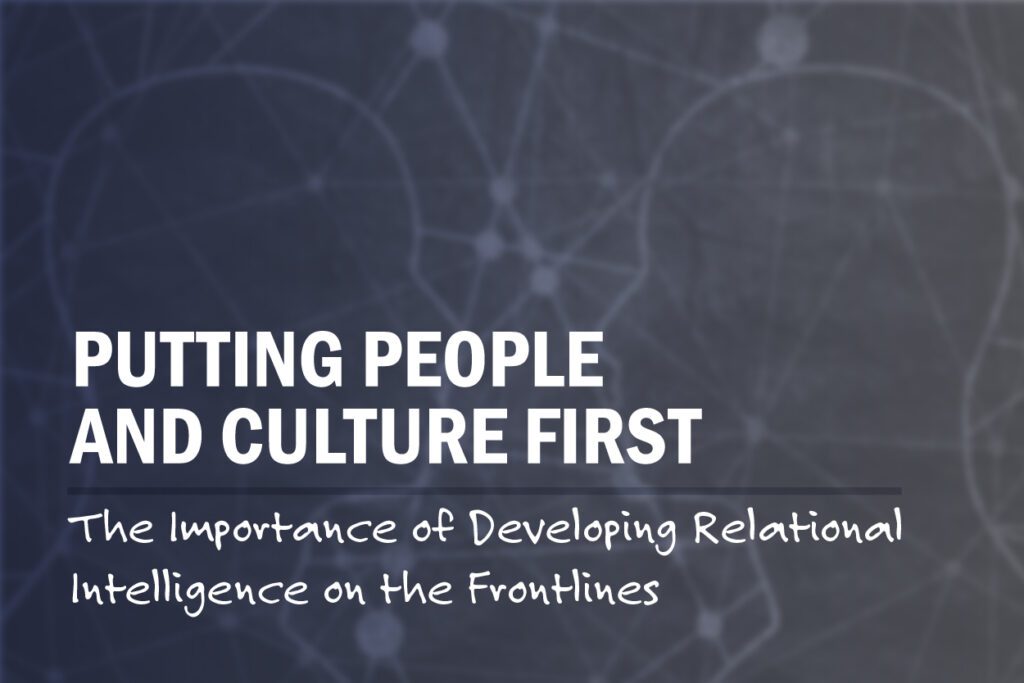By Dr. Adam C. Bandelli, Managing Director of Bandelli & Associates and author of RELATIONAL INTELLIGENCE: THE FIVE ESSENTIAL SKILLS YOU NEED TO BUILD LIFE-CHANGING RELATIONSHIPS
Making the transition from individual contributor to a new manager or supervisor can be an exciting and challenging time. There are several things that a frontline leader needs to think about. There is the need to set a vision for your team. Transitioning from peer to supervisor can be daunting if you don’t have a clear idea of your goals and objectives for the team. There is the need to be vigilant in your leadership. You must set clear expectations and hold people accountable. You also have to show up consistently for others. Do you practice what you preach and walk the talk? Do you model the right behaviors and set a positive example for your team members?
One of the most important things for a new manager or supervisor to do is build great relationships with their direct reports. This is the primary driver of getting the best work out of your team. To do this, you must learn and develop relational intelligence. Relational intelligence is the ability to successfully connect with people and build strong, long-lasting relationships. When frontlines supervisors practice relational intelligence with their people they build teams that are inclusive, stimulating, and exciting. It helps employees to effectively work together and collaborate with people from different backgrounds, cultures, and experiences.
So how does a new supervisor or frontline manager develop their relational intelligence? Here’s some quick tips you can apply right away:
- Establishing Rapport and Understanding Others – Build Connections with Your People: Employees are engaged and empowered when they feel a strong connection to their supervisors. They stay committed when they feel they can make a real contribution to the organization. To do this, get to know all the members of your team as individuals. Make it a priority to meet with them one-on-one (in-person or virtually) and ask them a lot of questions. Find out what their goals and ambitions are. Ask them what they want to learn and how they want to grow. While it is important to do a lot of listening, take the opportunity to share some things about yourself. A team member might be interested to learn about your personal journey. This is one of the best ways to show up as a genuine and authentic supervisor. And it’s ok to get personal too. Share information about your life and ask them about theirs. Learning about your peoples’ hobbies, interests, and life outside of work offers opportunities to bond and form deeper connections.
- Embracing Individual Differences – Inclusivity Matters: As a supervisor, it is critical to set the tone that inclusion matters. Embracing peoples’ differences means understanding and accepting that people might be different from you, and those differences, be they gender, ethnicities, race, sexual orientation, religion, or socioeconomic background, are what makes teams strong. When you accept people who are different from you, you can more effectively communicate with them. This helps to strengthen the quality of relationships that you have with your employees. So, make every member of your team feel valued, important, and appreciated. Encourage diversity of thought. You want people on your team who think differently.
- Developing Trust and Cultivating Influence – Empower Everyone on Your Team: Successfully supervising a great team requires getting everyone on the same page. This is where developing trust becomes critical. Do you have common values and guiding principles that people can rally behind? Do you have a core shared purpose and vision that provides direction and meaning to your people? Frequent targeted communication is key for unifying your people around a common goal. Share news on progress towards major objectives. Highlight key milestones and celebrate the victories along the way. Create a time and space for people to vent and share their concerns – personally and professionally. Remember the lines between work and personal life have become more blurred during the last two years. Give your people opportunities to talk about how they are doing. This is the best way to display empathy and compassion for your people.
The Bottom Line
Relational intelligence is what all new and frontline supervisors need to develop. The employees of today care about more than just title, pay, and compensation. They want to know that their work has meaning. They want managers and supervisors who will intentionally invest in their growth and development. And they want that personal human connection – something that has been lost during the COVID-19 pandemic. Something that we desperately need to get back so we can achieve great success at work.
About the Author
Adam C. Bandelli, Ph.D. is the Founder & Managing Director of Bandelli & Associates, a boutique consulting firm focusing on leadership advisory services and organizational effectiveness. He is the author of the books, RELATIONAL INTELLIGENCE: The Five Essential Skills You Need to Build Life-Changing Relationships and WHAT EVERY LEADER NEEDS: The Ten Universal and Indisputable Competencies of Leadership Effectiveness. For more information, visit the firm’s website at www.bandelliandassociates.com.


0 comments